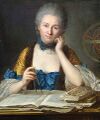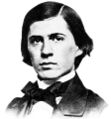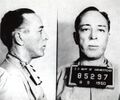Template:Selected anniversaries/September 10: Difference between revisions
No edit summary |
No edit summary |
||
| (45 intermediate revisions by the same user not shown) | |||
| Line 1: | Line 1: | ||
<gallery | <gallery> | ||
File:Emilie Chatelet portrait by Latour.jpg | File:Ioannes Faulhaberus Mathematicus Imperialis Ulmæ Natus.png|link=Johann Faulhaber (nonfiction)|1635: Mathematician [[Johann Faulhaber (nonfiction)|Johann Faulhaber]] dies. Faulhaber calculated the sums of powers of integers. | ||
File: | |||
File:Dalton Trumbo prison 1950.jpg|link=Dalton Trumbo (nonfiction)|1976: Screenwriter and novelist [[Dalton Trumbo (nonfiction)|Dalton Trumbo]] dies. | ||1732: Jacques d'Allonville dies ... astronomer and mathematician. Pic search. | ||
File:Emilie Chatelet portrait by Latour.jpg|link=Émilie du Châtelet (nonfiction)|1749: Mathematician and physicist [[Émilie du Châtelet (nonfiction)|Émilie du Châtelet]] born. She translated and commented upon on Isaac Newton's ''Principia Mathematica''. | |||
||1788: Archaeologist and antiquary Jacques Boucher de Crèvecœur de Perthes born ... notable for his discovery, in about 1830, of flint tools in the gravels of the Somme valley. Pic. | |||
||1797: Carl Gustaf Mosander born ... chemist. He discovered the elements lanthanum, erbium and terbium. Pic. | |||
||1846: Elias Howe is granted a patent for the sewing machine. Pic. | |||
File:Charles Sanders Peirce in 1859.jpg|link=Charles Sanders Peirce (nonfiction)|1849: Mathematician and philosopher [[Charles Sanders Peirce (nonfiction)|Charles Sanders Peirce]] born. He wil be remembered as "the father of pragmatism". | |||
||1857: James Edward Keeler born ... was an American astronomer was an American astronomer who confirmed Maxwell's theory that the rings of Saturn were not solid (requiring uniform rotation), but composed of meteoric particles (with rotational velocity given by Kepler's 3rd law). His spectrogram of 9 Apr 1895 of the rings of Saturn showed the Doppler shift indicating variation of radial velocity along the slit. At the age of 21, he observed the solar eclipse of Jul 1878, with the Naval Observatory expedition to Colorado. He directed the Allegheny Observatory (1891-8) and the Lick Observatory from 1898, where, working with the Crossley reflector, he observed large numbers of nebulae whose existence had never before been suspected. Pic. | |||
||1858: George Mary Searle discovers the asteroid 55 Pandora. Pic. | |||
||1863: Charles Edward Spearman born ... psychologist known for work in statistics, as a pioneer of factor analysis, and for Spearman's rank correlation coefficient. He also did seminal work on models for human intelligence, including his theory that disparate cognitive test scores reflect a single General intelligence factor and coining the term g factor. Pic. | |||
File:Arthur Compton 1927.jpg|link=Arthur Compton (nonfiction)|1892: American physicist and academic [[Arthur Compton (nonfiction)|Arthur Compton]] born. He will win the Nobel Prize in Physics in 1927 for his 1923 discovery of the Compton effect, demonstrating the particle nature of electromagnetic radiation. | |||
||1898: Waldo Semon born ... chemist and engineer ... credited with inventing methods for making polyvinyl chloride useful. Pic. | |||
||1903: Georges de Rham born ... mathematician, known for his contributions to differential topology. Pic: http://www-history.mcs.st-and.ac.uk/PictDisplay/De_Rham.html | |||
||1910: Zdenko Hans Skraup dies ... chemist who discovered the Skraup reaction, the first quinoline synthesis. Pic. | |||
||1915: Karl Eugen Guthe dies ... American academic and physicist, notable for being the first Dean of the Graduate Department at the University of Michigan. Pic. | |||
||1931: Dmitri Fyodorovich Egorov ... mathematician known for significant contributions to the areas of differential geometry and mathematical analysis. Pic. | |||
||1941: Fritz Noether dies ... mathematician. Pic. | |||
||1941: Stephen Jay Gould born ... paleontologist, biologist, and author. Pic. | |||
||1956: Astronomer Robert Julius Trumpler dies. He will observe that the brightness of the more distant open clusters is lower than expected, and the stars appear more red, a phenomenon caused by interstellar dust absorbing interstellar light. Pic. | |||
||1966: Emil Julius Gumbel dies ... mathematician and statistician. Gumbel was instrumental in the development of extreme value theory, along with Leonard Tippett and Ronald Fisher. He also derived and analyzed the probability distribution that is now known as the Gumbel distribution in his honor. Pic search. | |||
||1970: Heinz Rutishauser dies ... mathematician and a pioneer of modern numerical mathematics and computer science. Pic search. | |||
||1975: George Paget Thomson dies ... physicist and academic ... discovered of the wave properties of the electron by electron diffraction. Pic. | |||
File:Dalton Trumbo prison 1950.jpg|link=Dalton Trumbo (nonfiction)|1976: Screenwriter and novelist [[Dalton Trumbo (nonfiction)|Dalton Trumbo]] dies. He was blacklisted for refusing testify before the House Un-American Activities Committee (HUAC) in 1947; while blacklisted, he won Academy Awards for two films: ''Roman Holiday'', attributed to a front author, and ''The Brave One'' under the pseudonym Robert Rich. | |||
||1983: Felix Bloch dies ... physicist and academic, Nobel Prize laureate. Pic. | |||
||1984: Jerome C. Hunsaker dies ... aeronautical engineer who made major innovations in the design of aircraft and lighter-than-air ships, seaplanes, and carrier-based aircraft. His career had spanned the entire existence of the aerospace industry, from the very beginnings of aeronautics to exploration of the solar system. He received his master's degree in naval architecture from M.I.T. in 1912. At about the same time seeing a flight by Bleriot around Boston harbour attracted him to the fledgling field of aeronautics. By 1916, he became MIT's first Ph.D. in aeronautical engineering. He designed the NC (Navy Curtiss) flying boat with the capability of crossing the Atlantic. It was the largest aircraft in the world at the time, with four engines and a crew of six. Pic. | |||
||1985: Ernst Öpik dies ... astronomer and astrophysicist. Pic. | |||
||2000: William Nierenberg dies ... physicist who worked on the Manhattan Project and was director of the Scripps Institution of Oceanography from 1965 through 1986. Pic. | |||
||2005: Hermann Bondi dies ... mathematician and cosmologist. Pic. | |||
||2008: The Large Hadron Collider at CERN, described as the biggest scientific experiment in history, is powered up in Geneva, Switzerland. | |||
||2014: Edward Nelson dies ... mathematician and academic. Pic. | |||
|File:Greedy algorithm 36 cents.svg|link=Greedy algorithm (nonfiction)|2017: New study of algorithmic paradigms finds that [[Greedy algorithm (nonfiction)|Greedy algorithms]] are studied more often than other algorithmic paradigms. | |||
</gallery> | </gallery> | ||
Latest revision as of 12:53, 7 February 2022
1635: Mathematician Johann Faulhaber dies. Faulhaber calculated the sums of powers of integers.
1749: Mathematician and physicist Émilie du Châtelet born. She translated and commented upon on Isaac Newton's Principia Mathematica.
1849: Mathematician and philosopher Charles Sanders Peirce born. He wil be remembered as "the father of pragmatism".
1892: American physicist and academic Arthur Compton born. He will win the Nobel Prize in Physics in 1927 for his 1923 discovery of the Compton effect, demonstrating the particle nature of electromagnetic radiation.
1976: Screenwriter and novelist Dalton Trumbo dies. He was blacklisted for refusing testify before the House Un-American Activities Committee (HUAC) in 1947; while blacklisted, he won Academy Awards for two films: Roman Holiday, attributed to a front author, and The Brave One under the pseudonym Robert Rich.




